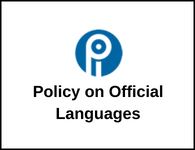Policy on Official Languages
1. EFFECTIVE DATE
November 16, 2016
2. PREAMBLE
In order to ensure compliance with its By-Laws and Regulations relating to the use of English and French(1), the Professional Institute of the Public Service of Canada is providing the following procedures to clarify their implementation.
This policy is also consistent with the Charter of Rights and Freedoms that establishes English and French as the official languages of Canada. Both the Canadian Constitution and PIPSC support and recognize this fundamental Canadian value.
In areas of federal jurisdiction and, therefore, in the majority of our members’ workplaces:
- English and French enjoy equal status and rights. The Official Languages Act ensures the respect of language rights and provides a legislative base for the use of both official languages as work languages in the federal public service.
- Everyone has the right to use English or French in the Parliament of Canada.
- Federal legislation must be adopted in both English and French.
- Everyone has the right to use English or French in a federal court.
- Canadians have the right, subject to the stipulations of the Charter, to services in the official language of their choice when dealing with federal departments and agencies.
3. POLICY OBJECTIVES
To maintain a bilingual work environment that promotes the Institute’s core purpose, that is, “building community to act collectively to improve our members’ lives.” Members can therefore choose to live and work in English or in French, regardless of their mother tongue.
4. POLICY REQUIREMENTS
As a union, the Professional Institute of the Public Service of Canada is committed to providing individually and collectively, in accordance with its By-Laws and Regulations, an environment that encourages the use of both official languages.
The Institute is also committed to defending the rights and values of its members in the workplace. Respect for, and acknowledgment of, the use of English and French as work languages in federal institutions, are the key foundation of establishing the equal status of both languages in the spirit of the Official Languages Act.
4.1 The Institute is committed to creating and fostering a workplace conducive to the use of both official languages. Accordingly, members are encouraged to:
- work in the language of their choice;
- use the official language of their choice and work in an environment conducive to the use of both official languages;
- respect and encourage the members’ language of choice in one-on-one and group communications;
- understand members’ needs and provide the necessary work and communication tools in both official languages;
- hold bilingual meetings and/or recognize the participants’ choice of language. Meeting chairs must make every effort to take the languages rights of their members into consideration as they conduct their meetings.
4.2 The Institute’s Board of Directors and its support staff are committed to:
- exercising the leadership required to foster an organization conducive to the effective use of both official languages;
- ensuring that services and publications are simultaneously provided in both official languages;
- appointing from among its Board members, a representative to advise the President, on official languages;
- establishing a standing Advisory Committee (presently represented by the Task Force on Official Languages), whose purpose is to advise the Board of Directors on introducing best practices and to coordinate activities promoting an organization conducive to the effective use of both official languages within the Institute and in members’ workplace.
(1) PIPSC BY-LAWS
27.1 The official languages of the Institute shall be English and French.
27.2 Each member shall be entitled to deal with and receive all services from the Institute in the official language of his choice. All Institute general information materials shall be distributed simultaneously in both official languages.
27.3 The text of any By-Law, resolution or other written instrument shall be valid in either language, provided that, in the event of a difference in interpretation or meaning between the English and French texts, the meaning in the language of the text of origin shall govern. All By-Laws approved prior to November 12, 1994, shall be deemed to have the text of origin in the English language. All subsequent By-Laws will have the language of the text of origin so identified by indicating in brackets (English) or (French). Any translation shall be identified as such.


